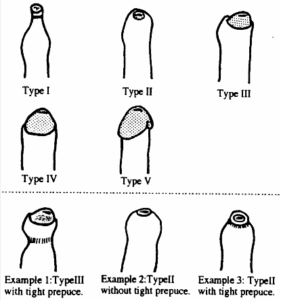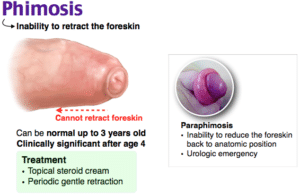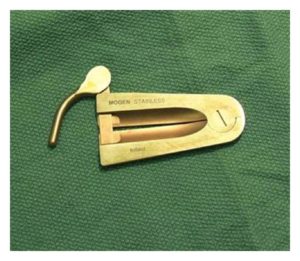Why Circumcision Should Be Legal in the United States
Let me start off by giving you a little about my background since I know biases are strong in both sides here and I want to be transparent with who I am and where I come from. I was raised Catholic and while my family was religiously moderate, I became an ultra-conversative zealot due to exposure from various sources on the internet. Nowadays I’ve reversed most of my beliefs, but one that I strongly believe is still valid is that circumcision of male infants should be legal. And before you ask: I am circumcized, and I do not plan on circumcizing my son.
I would urge the reader to read all of the points together rather than skimming through dismissing them in their head one by one, because I think this is one of those situations where the the points taken collectively are worth much more than the sum of their parts.
While arguing for a clear position, I will try to remain as unbiased as possible. In changing from zealot to someone who is non-religious I’ve argued with dozens if not hundreds of people on the internet regarding a wide number of issues including circumcision, and my best intention is to represent both sides fairly. I’m going to rely on mostly scientific studies in order to derive my points and I believe that scientists’ views on both sides should be viewed as equally reliable.
The Origins
The origins are disputed- it has religious origins and was probably was repopularized due to a preference for more chaste sons in the 1800’s, and not for health reasons- but the origins don’t matter. What matters is the real-world practicality of it, period. Next.
The Health Benefits
There are clear health benefits- and this isn’t in dispute by scientists in the medical field. The World Health Organization recommends circumcision in places like Sub-saharan Africa because it reduces the risk of HIV infection by an incredible 60%. However, we need to make sure we apply this to the United States, where HIV is less prevalent, HIV is less deadly and life changing due to healthcare access, and there is easier access to condoms. A study in 2008 found circumcision was not effective in preventing HIV in gay men but a study in 2011 found there was a certain degree o protection and a study in 2017 found that there was a certain degree of protection against HIV in gay men, but with a greater impact on heterosexual men. So if we’re treating all scientists as equally reliable and giving more credibility to newer, more numerous studies, it is fair to say that HIV reduction is present at the very least in heterosexual men- if we’re being skeptics it's fair to say that the jury is out, and if we’re ignorant we can say that there is no evidence linking circumcision to HIV prevention.
Another benefit is a reduction in penile cancer- but penile cancer itself is rare, affecting about 1 in 100,000. Taking into account the population that’s 1,500 occurrences annually with an unknown amount of deaths resulting from it. When your population is 300,000,000, this is a very, very negligible number and not really worth addressing. If you do want to take it into account, according to three studies it virtually eliminates the chance of penile cancer in men circumcised as infants but increases the likelihood of invasive penile cancer when the operation is performed as an adult. Prostate cancer, too, is reduced with circumcision according to one study done in 2015 and one study done in 2016. Additionally it’s been found to reduce the risk of several cancers in women who are partners with circumcised men though with no noticeable reduction to HPV and HIV.
An often overlooked benefit, because we don’t find Urinary Tract Infections to be very threatening, is a significantly reduced risk of a UTI. UTI’s aren’t viewed as life threatening, but they should be. Most UTI’s occur in the first few years of life and that’s when they’re the most deadly. Uncircumcised infants are up to 10 times more likely to get a UTI than circumcised infants. I emphasize the age because it’s important to remember circumcision of infants generally, rather than adults. UTI’s killed 196,500 people in 2015 out of 150,000,000 total affected. In the United States between 1998-2011, of the 960,516 UTI infections, 30% were male, and 1.75% resulted in death. So I’m potentially doing the math wrong, but that should equate to 5,042 male deaths total, about 400 a year. This is also only for cases in adults, I couldn’t find data on infants, but I imagine their body would be a lot worse in fighting off infection. Despite not having the direct data, there are other ways to approximate the threat of UTI's towards American male children is to consider the fact that there was as high as a 20% mortality rate for UTI's in the pre-antibiotic era, and to consider that UTI's have a high chance of leading to bacteremia, which has a 10% mortality rate in infants. Long story short, UTI’s are a huge risk. Now an important point that anti-circumcision people will raise is that giving extra attention to cleaning your dick makes the gap between UTI occurrences in circumcised and uncircumcised males narrow significantly, which is 100% correct, but we need to apply this practically. Just like how condom use is 99.9% percent effective we need to take into account the human aspect of it- people don’t use condoms, and people don’t thoroughly clean their penis enough. People die due to factors combined with their own irresponsibility. This doesn’t make the data any less important. And we should especially consider how this applies to infants. Infants aren’t adults who have their own agency over how clean their penis is, and neither do their parents. You may have an especially efficacious mother that will make extra certain that her child’s penis is especially clean to prevent UTI’s, but one thing they will never be able to prevent is kids pissing themselves. Urine residue in and around the urinary tract is what causes UTI’s, and no amount of responsibility from a parent can prevent that. That extra phimosis skin is a problem that can lead to death.
I’ve seen many a person on the internet advise people that circumcision is never necessary for phimosis, and that a generous amount of lubrication, lotion, and stretching will remove any problem that phimosis has caused, and reducing your sexual pleasure via circumcision is not worth that exchange. And this is true in many cases, but there are many cases where it is not. All foreskins are different and there are different degrees of phimosis. Some skin is so tight that people have never seen the head of their penis, have constantly had urine dripping through their foreskin every time they use the bathroom, and it can be so tight that people have trouble peeing at all. While doctors generally leave the choice of circumcision as a default up to the parents, doctors strongly recommend circumcision in these more extreme cases- you can view the different foreskin types below. These more extreme cases have a definite reduction in sexual pleasure- inability to maintain and erection and inability to move your foreskin back and forth at all remove the ability to have sex altogether or at the very least make it extremely painful. More often the case is, probably, that sexual pleasure is reduced by circumcision generally, but to what degree is very important, which is what we’ll discuss next.


The Sexual Pleasure Reduction
I want to start out by saying I’ve seen many intactivist scientists give estimates as to how much sexual reduction is reduced- relying on figures such as counting the density of nerve endings in the foreskin and trying to come up with a number to describe a reduction in sexual pleasure- this is dumb, is considered to be dumb by the medical community at large, and it often comes from biased activist organizations rather than unbiased scientific researchers. Sexual pleasure is a very subjective experience and it’s not reducible to the density of nerve endings. Sexual pleasure in men is felt from a variety of factors but mainly from the skin rubbing up against the head of the penis, which results in more movement from circumcized men and less movement in uncircumcized men when they’re masturbating. Is all of that sexual pleasure from the upper foreskin eliminated via amputation? Yes- but the entire foreskin isn’t used all at once, and circumcized men use more movement and more of the lower foreskin. How does this relate to sexual pleasure? We can’t tell, it’s subjective.
Scientific studies should be relied on and respected, but you can see how speculation that 30% pleasure reduction comes from a 30% area reduction just doesn’t work out. The correct scientific studies we should look at are surveys from circumcised and uncircumcised men who were circumcised later in life and whether they prefer their penis before or after.
The results? Mixed. Some studies found that post-circumcized men prefer it, and others found the opposite. Most found generally that there was not much of a change:
A 2001 study found that sexual sensitivity was reduced in all subjects after circumcision
A 2004 American study with a small sample of 38 men found that 22 men “would not have the surgery again” 13 of the men would, and the remaining 5 had no preference and 50% regretted being circumcised while the other 50% preferred it (so the reluctance for circumcision was mostly based on the surgery and recovery itself)
A 2008 study in Uganda found no change in sexual sensitivity after the procedure
A 2008 study in Kenya found no change in sexual sensitivity after the procedure
A 2013 study done in Belgium that rated a variety of factors such as orgasm intensity, orgasm effort, pleasure, discomfort, etc. on a 5 point scale found being circumcised to be about 10% worse in those areas., though this has been criticized for having a flawed sample, as most men in Belgium are uncircumcized and only get circumcized for medical reasons, but made up a majority of the participants.
The numbers are usually pretty close to 40-60% range either way with one outlier saying sensitivity was reduced in literally all subjects and one outlier saying that it was a significant improvement, but looking at them altogether it appears that men generally do prefer uncircumcized penises to circumcized ones to a small degree- how much that degree is, we can’t know, since the only study to rate the change outside of a binary “better” or “worse” scale was disputed. But there are four important things to keep in mind here:
- Scientists of studies coming to opposite conclusions, some with clear bias, explain away the closeness of the survey results with an explanation along the lines that “Social comparison and the reputation for circumcision (or remaining uncircumcised) may have biased the results and may have caused those surveyed to have a preference for the other based only on what they’ve heard others say regarding the change in sexual pleasure”
- There is a margin of error here, +/- 7% in many of the studies with more split results can make it so there’s hardly a difference at all, a coin toss that can go either way- a lot of these have smaller sample sizes and can make it even worse. I’d like to think with the overall ranges that we can observe a slight reduction in sexual pleasure in circumcized men but I want to emphasize how narrow this gap is, and how small that change in pleasure may be for people to answer surveys this way.
- Since we can observe that if most find no change, and there are a decent (but lesser) amount of people who find an improvement than people who find it to be worse, we can deduce that that change in pleasure is small, since the amount that reported “no noticeable change” is the highest in all studies with one exception
- The Pepsi Challenge. The Pepsi Challenge was an experiment conducted by Pepsi that found that over 50% of soda drinkers in a blind taste test preferred Pepsi to Coke. When the study was conducted later, it found 62% of blind taste testers preferred Coke to Pepsi, and that while most were confident they could tell the difference between Pepsi and Coke, less than 50% actually could. But the most important thing gained from these experiments is that the brand of soda had a significant improvement on how much you enjoy it- when the names are known, people rate Coke significantly higher than Pepsi.
The scientists explaining the social comparison factor in preferring being circumcised to being uncircumcised isn’t wrong, it’s very true. The reputation for either type of penis can have a very real effect on how much we perceive enjoying it.
In conclusion- circumcision probably, but not certainly, reduces sexual pleasure in men without particularly difficult cases of phimosis. How much that reduction is, is subjective for a WIDE variety of reasons, and the difference is about as negligible as people’s preference for Coke over Pepsi.
But many think that the health benefits and changes in sexual pleasure should come second to the child’s bodily autonomy, a perspective that has gained strength in recent years.
The Right to Bodily Autonomy and the Procedure
While the value bodily autonomy is subjective, I do find it to be very important. An infant’s bodily autonomy is a matter for debate because parents are tasked with making every decision for the baby up until it can make its own, several years later. If the benefits for circumcision were as applicable in later years as they were in earlier years (as emphasized earlier), I would wholeheartedly support circumcision only later in life, but according to the consensus of health researchers that simply isn’t the case.
We should draw a consistency between what parents can and cannot decide for them when they’re infants. Most people think parents shouldn’t be able to give their kids permanent tattoos. Most people think parents should be able to vaccinate their kids or that they should be required to vaccinate their kids, for the obvious health benefits. A majority (but shrinking) number of people think parents should be able to pierce the ears of their infant daughter, but simultaneously don’t think that parents should be able to pierce their sons ears or that they should be able to put in gauges or make other body modification into their son's ears. Most people think parents should be able to consent to a life-saving surgery for a child, or opt for a surgery that will prevent them from being disabled, but some don’t. Most people think parents should be able to dress and style the hair of their kid however they want. What would the child want? None of this. They don’t want to be poked with a needle or have any surgery done to them, they can’t understand health benefits or aesthetics, they’re infants, it wouldn’t be logical to let them have any say in these decisions- so we place the decision and the consent in the arms of their parents. The clear factors that people value are the health/livelihood benefits or mere inconsequentialism of a decision. Society is moving in a direction where something as simple and temporary as the pain from an ear piercing shouldn’t be permitted to be done to a child, and I don’t necessarily think that’s a bad thing- the idea that a children should not be vaccinated because they can't consent to the pain of the needle, most would agree, is going too far.
If we’re meant to be consistent here, a circumcision in practical terms is significantly more painful vaccine, or a vaccine done at a point in time where the child won’t remember the pain. It also has minor (or major if you’re religious), aesthetic benefits. Depending on who you are, you may view it either way even if you fully accept the consensus from scientists on the health benefits and sexual pleasure reduction. But I feel many stick to the argument that “A child cannot consent ao circumcision, period”, while either ignoring the benefits, or making the statement with the premise that it should be true in all cases while ignoring the obvious demand for vaccines at younger ages. The idea shouldn’t be dismissed wholesale because "A parent shouldn’t make bodily decisions for a child under any circumstances", and it shouldn’t be wholeheartedly accepted because "There are health benefits"; it should be a cost-benefit analysis.
The procedure itself deserves scrutiny here. We should try to analyze the subjectivity of pain (or trauma as some goofballs suggest) of this surgery (or genital mutilation or amputation as some goofballs suggest).
If performed before the age of 3, before the human brain is developed enough to record meaningful memories, the pain in a partially developed brain won’t be remembered and isn’t worth fussing about in terms of long term trauma. If performed early enough, before 5 months old, the brain isn’t developed enough to be what we consider to be “conscious” very much at all. In terms of how much pain it is- it’s subjective. We can’t tell unless infants can communicate to us. However, one study recommends doing it within the first week of life for a “pain free” circumcision (done with a Mogen clamp, see below) and notes, importantly, that the earlier the surgery is done the better, as the risk of complications increases with age.

When performed correctly with anesthesia using other methods, the pain (and how an infant processes pain) would be a sharp stinging pain similar to getting cut with a knife- potentially reduced or potentially increased by the way infants process pain being underdeveloped but handling pain in a way that infants who are not used to handling pain do.
When performed correctly, I will emphasize again, because botched procedures do happen. Allegedly somewhere between 30 and ~117 are killed annually from complications due to circumcision, so between 3 and 9 in 100,000. The deaths are due to excessive bleeding, anesthesia complications, etc., but taking into account the threat of deadly diseases mentioned above, these numbers are negligible and make up for themselves anyway. I would take these numbers with a grain of salt, since I tend to see them only on intactivist websites rather than health websites. Botched circumcisions can result in an unintentional mutilation of the penis which there aren’t really statistics on, but I would imagine the risk is lower- the study above that mentioned the pain free method of circumcision had samples large enough to account for a 0.4% risk of infection, but found had no instances of permanently disfigured penises to give any numbers on despite mentioning the possibility.
So taking into account everything we have so far- the health benefits are noticeable and there but some may not be consider them to be worth in exchange for the slightly reduced sexual pleasure and what many would consider a huge violation of bodily autonomy; the reduced sexual pleasure is probably there, but negligible, the bodily autonomy thing is subjective, the pain and risk from the procedure varies and is subjective- and may be forgotten (or never recorded in memory), or may be reduced or eliminated with anaesthesia. All of this negligibility and subjectivity and unknowableness together results should result in the conclusion of “ ¯\_(ツ)_/¯” -opinions like those from The American Academy of Pediatrics that believe it’s “worth it” and from The British NHS that consider it “not medically necessary” don’t matter because subjective ethical ideas about bodily autonomy aren’t their field, and they don’t determine the value of comparing the apples and oranges of sexual sensitivity and sexual health.
So why is my opinion on it, “It should be legal” , instead of “ ¯\_(ツ)_/¯”? Because of that whole botched procedure part.
The Legal and Practical Ramifications
What happens when we make a product or service illegal? If hard to obtain, that product or service is used less often, but is used nonetheless, and used unregulated. If that product or service easy to get, it's used more often and used unregulated. This is true of everything- abortions, guns, alcohol, weed, prostitution, etc. It’s never taken away entirely. Abortions performed by professionals are replaced with baseball bat and coat hanger abortions. Alcohol made by distilleries and verified by the FDA are replaced with alcohol created in people’s basements. Drugs respected by culpable pharmaceutical companies are replaced with dangerous drugs are laced, cut, or poisoned. Unregulated prostitution results in unprotected sex workers that are more likely to be sex slaves, underage, infected with STI’s, or a combination of the three.

Yes, back alley circumcision. I know, I know, it sounds funny. But it’s not really a far cry from reality. Hear me out.
Christians, Jews, and Muslims make up 90% of the United States. A majority of those believe in circumcision. For Muslim and Christians, there are many interpretations that being uncircumcised will send you to hell. For Jewish traditions that don’t believe in hell, it’s considered a very, very important rite of passage.
http://www.iranicaonline.org/articles/circumcision
http://www.lasttrumpet.org/circumcision.htm
For those that believe in hell, even if they’re wrong, they will go to extreme lengths to prevent their child from going to hell. That means seeking out non-professionals or doing it themselves. Crazies in the United States aren’t uncommon. More people in the United States believe in angels than any other country. There are plenty of cases where people would rather pray in order to cure a child than to send them to the doctor. Making circumcision illegal won’t stop it, it will only reduce it. For those that are still getting circumcised after it’s made illegal, they’ll be subject to a higher likelihood of botched surgeries- if professional surgeons can make those rare mistakes that end up killing or permanently disfiguring boys, imagine the damage untrained parents or religious leaders doing back-alley circumcisions can do. This isn’t unheard of, this has already happened for the significantly more obscure practice of female circumcision in the United States. This will happen for the procedure that is supported by a majority of people.
In conclusion, we need to choose the lesser of two evils here- if the sexual pleasure reduction was incredibly significant, and the health benefits didn’t exist, then I think it would still be fair for it to be illegal for bodily autonomy’s sake- but taking into account that the sexual pleasure reduction is negligible, the health benefits are massive, and the potential fallout of unregulated circumcisions is a horror story- the best policy in order to protect children (which I think is everyone’s goal here, no matter what side you’re on and no matter what you believe), is to keep it legal.

